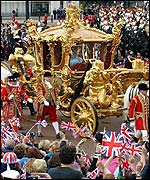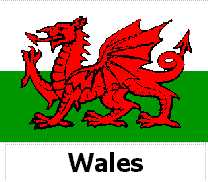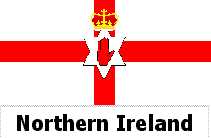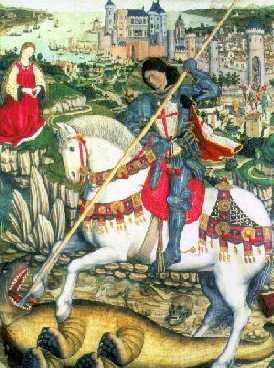Mind Streaming
John Coxon's Online Journal|
Archive Search |
| Links |
|
and s-integrator |
Friday, March 21, 2003
Sunday, March 16, 2003
Every year, the ' Last night at the Proms', at London's Albert Hall, sees me listening in, with the volume turned right up, and singing 'Rule Britannia' and 'Land of Hope and Glory' with unashamed gusto even though both were, formerly, anthems to British colonial power and the enslavement of foreign people within our once powerful British Empire. Both hark back to that long history that gives the nation, in part, its sense of global worth, even though, in terms of land mass, we are a tiny island race.
Now it is well known that Sir Edward Elgar was very upset when his great tune, from 'Pomp and Circumstance' was set to such nationalistic words, which spoke of British aggrandisement and widening its boundaries, and yet I quite like the idea that I belong to a country that is the 'land of hope and glory, mother of the free'. 'Though shalt be exalted, who are born of thee' the song continues. Our own official national anthem is uniquely self-centred and simply about the current monarch and, thus in urgent need of a replacement. 'God save the Queen' is a very strange and dull national tune , as are its sentiments.
The Christian God, whose faith the queen officially defends and represents, is not my God, nor is He , in a multi-national country, the force He once was. Maybe the place is still held together by essentially 'Christian' values, but all major faiths have similar beliefs and are essentially constructive and humanitarian in their view of others and how we should behave towards them. Our current anthem invokes His power to preserve the monarch, not us. At least 'Rule Britannia' has the inspiring line 'Britain's never, never shall be slaves', and yet we are slave to an anachronistic system. Other nations have songs, which actually sing of a national pride, like 'Advance Australia Fair' and not an individual.
France and America share anthems that relate to important historical events which continue to inspire because those events epitomised and defined the country's spirit. The 'star spangled banner' is a great tune and lyric. Essentially a poem inspired, during the American Revolution, by Francis Scot Keys , he having witnessed, from a boat, the pyrotechnics of the British naval bombardment of Fort McHenry, Baltimore, a song which was only adopted as the American National anthem as late as 1931, even though he wrote it in 1814. It turns out that Keys had just finished negotiating with the British for the release of a Dr. William Beanes an American civilian taken prisoner on their march from Washington. The huge flag that flew defiantly over the fort was used by American witnesses to gauge the state of play. ( Even today, taking down your opponent's flag and replacing it with your own is an important symbolic gesture.) The American national flag has been symbolically burned on many occasions across the world, but the spirit, of which it is merely the representation, is flame proof, as are all national flags.
Similarly in France, we have a national song from a decisive moment in their history, when they too were fighting for liberty. Our problem in Britain is, that through the almost blind acceptance of monarchy, essentially we have lacked a single defining moment and avoided revolution, and hence our national song is static and is thus not inspiring in any sense. It is the anthem of the status quo. It is a self perpetuating song , since, if the monarch dies, and the next one is of a different gender, the lyric simply changes from Queen to King and back again.
Americans and other nationals have a charming gesture of placing their hands on their hearts when the national song is played. Not in England. We simply stand and drone respectfully as we have been conditioned to do, regardless of whether we think the monarchy has any real value these days. Kings and princes in former times here had a God given, divine right, to rule, simply by accident of birth, and nobles were supposed to epitomise the best. Given the current behaviour of some of the royal family, it is questionable now , if they really do set a worthy example. Our problem , as nation is that, in the monarchy, we have persons, subject after all, like us, to human frailties, evidently ordinary( but immensely priviledged), and yet endowed, through history at least , with superhuman qualities that are completely false and transparent in modern times and yet we officially are subject to their symbolic power. Alas we are stuck with this awful tune, partly because it has such a long history of associations.
johncoxon 1:35 AM - [Link] - Comments ()
...
WHICH FLAG SHOULD I WAVE?
I remember, as a child, in the late fifties, having a welcome morning away from schoolbooks just so we could all line the main street, five deep, in the sea-side town of Weymouth, and participate in what seems now, a civically engineered display of support for the Monarchy. We were to get a very fleeting glimpse of her majesty and family, as her long, black, gleaming royal customised Rolls Royce convoy swept past the plebeian throngs. School provided us all with a miniature linen Union Jack on a stick which we waved with innocent enthusiasm, faintly charming, no doubt, for the royal blur as it swept past us. This little cameo illustrates the principal that the Union Jack flag is linked inextricably with loyalty to the crown.
Nationalism and patriotism isn't actively promoted in schools from an early age even though more recently schools have been asked by the present government to be bolder in the promotion of British achievement in history teaching. But core national values are passed down in children's stories, especially the folk and fairy tales told to the very young. Some of these refer to Princes and Princesses, the former rescue the latter and they live happy ever after. When your country doesn't actively promote nationalism and patriotism, you pick it up, like I did, getting that sense of belonging to a nation from things like my parents values, history lessons, items of national news, glimpses of Parliament, the royal family and especially ceremonial national events, largely broadcast by the BBC.
Waving the flag was something you were expected to do back then, these days you can at least exercise choice. I used to go to the cinema as a child and watch cowboy films at the Saturday Club. At he end of every theatre performance, in those days, your were expected to stand, as the national anthem, 'God Save the Queen' was always sung and this you dutiful did, probably not knowing why. Later, people would cut out early to avoid having to sing. I think, today, the anthem is sung only if a member of the royal family got in with a free ticket.
With regard to flags as an emblem of national identity, it was on Weymouth's white sandy beach, I spent hours in the summer sunshine with my family, making 'sand castles' by skilfully inverting buckets of wet sand and decorating my temporary turrets with an assortment of small paper flags you could buy, which included the national flags of the countries of Great Britain. I hardly noticed the monumental gilded statue of King George 111, (during whose reign the present day Union Jack was adopted as a national emblem) that still overlooks the beach, or even thought, for a moment, just how ridiculously self-congratulating it was that a small town would raise such an extravagant edifice just because a royal went for a therapeutic dip in their bit of water from a wheeled bathing machine all those years ago. Royal patronage in the form of a royal visits is always welcome at civic level and the ceremonial it generates and local government chest puffing is an essentially part of keeping the monarchy and nationalism on the agenda. Official flag flying is local government bread and butter
I always liked pattern of the Union Jack flag, even though it's design is quite complicated to colour in correctly in comparison to other world flags, most of which are easy to draw and invariably use deliciously striking primary colours. The Union Jack is, to my mind quite a curiosity in terms of national identity. Westminster, London, England is the seat of Government and for centuries, the throne has been based in London.

The flag design has ironic significance for me now, in it being the emblems of three nations, apparently united but actually superimposed on each other, with, mathematically, the cross of St George, preferentially, taking up most of the surface area and the blue of Scotland making up the background. By comparison, the Stars and Stripes is a better national metaphor, with recognition of the thirteen original states in stripes, but with the flexibility to have been changed when the union embraced a new state. It flew defiantly above Fort McHenry when the British tried to bombard it but failed to destroy the spirit it embodied that led to Revolution and Independence. Maybe this points to the real purpose of a flag, a pictorial embodiment of a corporate spirit with which we can identify.
Originally, the Union Jack was imposed politically as the national emblem. It originated in 1606, by a sort of marriage of convenience, when the Scottish king because king of England and it was decreed that British subjects should use a combination of the Scottish and English crosses. There was controversy even then about one nation obscuring the other on cloth. As always, power rested in the Capital and it had to be accepted and recognised regardless of the initial decent its adoption created.
Following changes in government rule, that allowed the Irish people to legislate for themselves, the flag of St. Patrick symbolised this rise in status and the modern Union Jack dates from 1801 by the Act of Union.
It is ironic that Wales, which has, like Scotland, its own national flag, is not represented.
Politically it is not a kingdom, it is a principality, which provides the son of the monarch with an impressive title, the Prince of Wales. 
Northern Ireland had a separate national flag, the red hand. That flag has now been officially replaced in favour of the Union Jack. To it there is still immense hostility, depending on personal religious and political allegiances. It may provide defiant re-assurance to some or is inflammatory to those who hate what is seen, historically, as English interference in their state. Politically, Northern Ireland symbolises the difficulty of finding a flag emblem that is representative and which doesn't aggravate the old wounds in a politically divided state.
When it comes to the flag I could endorse as representing a part of me, it is hard to disassociate myself, even though I am English, from the Union Jack even though the flag of St. George represents my county England. It is not surprising that, when I am teaching my kids with learning difficulties, I have never really successfully managed to provide a convincing definition of the abstract word nationality. In theory, at least, your country of birth defines your nationality, but is that regardless of where one or both or your parents originated from? Even harder for me as a teacher, (morally and professionally bound to inform and not to indoctrinate my pupils,) is when, as a British citizen, technically and legally, I should be promoting the idea that they are British, when I feel English myself. Nationality is concept hard to nail down. The Welsh and the Scottish don't have this same ambivalence, and have a stronger national identity than the English. I guess that is in a part, because we were invaded and modified by a number of foreign invaders who imposed their culture and language upon us (and are therefore a bit of a mongrel race) but Wales and Scotland remained relatively untouched by armies of occupation. I think that, in terms of our land, I have to accept that I have 'dual nationality', both English and British when it is sometimes to divorce one from the other.
Flags of course are less abstract than the notion of nationality , and it is easy to speak of their historical use, when they were used to muster uniformed troops in battle when a focal point, clearly identifiable from a distance, was used to re- group. Flags remain vitally important, symbolically, to the armed services, and here they embody the nation's back history and also re-enforce the fact that all military personnel have a duty to defend the integrity of their employers, the Crown, as well as the people they defend. Not only that but linked to the flag are memories of a long history of acts of incredible bravery and courage (for courage I like to read 'Grace under pressure') If a soldier is killed in combat, as in the States and other countries, the draping of the national flag over their coffin adds poignancy at the military funeral and gives dignity and meaning for their family, to what would otherwise be another unmarked tragic, but unnatural death.
In England it is unusual to see the national flag flying from public buildings as an everyday thing. Rarely still, are they hung from private houses, unless, for example, the national football team are, unusually, doing something spectacular in an international competition. Other than that, flags only come out on special occasions, particularly in ceremonials. The Queen's recent Jubilee saw this demonstrated on a dramatic scale that surprised a lot of people, especially the anti-monarchists, who had misgauged the scale of the Royal families popularity. I am not sure whether this outpouring of nationalism was truly genuine, or whether it was sentimental affection and nostalgia for a remarkable previous history under that flag and the hope of more to come. Certainly, the Queen and that flag have been a presence since my early childhood and I found myself feeling a sense of awe and national pride when the Mall in front of the palace was a sea of Union Jack waving . I admit to getting annual goose bumps at the Last Night of the Proms when Union Jack waving nationals sing to Elgar and those imported patriotic lyrics he is known to have disapproved of, 'Land of Hope and Glory'. I usually sing along very loudly, I freely admit. I don't think that nationalism is as open and every day here, as it is for example, in France or the United States. It is brought out of the cupboard at times when showing solidarity or doing the right thing is called for.
It has to be ironic that, nationalism in Britain is most often manifested, by association, in support of sport at both individual and team level, especially internationally. It also brings out that duality in the national spirit. In some ways only by comparison against the rest of the world's best, especially as a relatively small island race can you define yourself as successful. It is that David and Goliath thing that so appeals. There is no British football team; each country of our composite nation has its own team and colours. In athletics, at international level, an individual usually represents Great Britain and that has the merit that our small island maximises the possibilities of a win. If athletes or teams compete for Scotland or Wales, and the English are knocked out, then you can then root for the game Scot, who suddenly appeals to the sense of your being British after all. In one sense all athletic individuals model the more laudable characteristics we have or would like to have better developed. For them, the stamina and self-discipline for endless training, self-motivation and belief, and the determination to win or at least improve their performance through competition. Coming from a small island, often self-funded, it seems a more satisfying when you take on and beat someone from a much more affluent and bigger country. But again, I think such events are between individuals and ultimately each battles with themselves and others because that is what underpins all competition.
Although English born Paula Radcliffe is so often referred to as a British Athlete, she did her lap of honour at the Commonwealth Games, on this occasion, wearing the flag of England. 
There is immense pride in being chosen to represent the country at sports but national pride was far more discrete than it has become. It is common now for athletes who win to drape the national flag over their shoulders, thrown by a spectator, as if to remind them the their victory isn't exclusive to them., and do the obligatory lap of honour. This nationalises the individual achievement of a person essentially battling against themselves or as part of a team. The British art of losing and being noble runner up in such events had its national roots in Old world manners. National identity, we were told, used to be instilled on the playing fields of England. As I remember, taking part in compulsory team school games was the thing, and actually winning was not the main point. Losing graciously was a national imperative as was fairplay and consideration and courtesy for the vanquished opponent. That 'After you George' was a mental block to winning and has only recently been modified and Britons do win now and again. We can only assume that athletes do truly represent us and that their nationality is important to them but personal characteristics they display can pander to national stereotype.
Nowhere is this expressed better than at Wimbledon in the game of Tennis. Consider Henman and Rusedski, some of the new breed that actually want to win and not just take part. When Greg was winning, ironically, he was British; when he was in a rut he was a naturalised Canadian! Henman is essentially English and there is always that mental attitude flaw that somehow always dogged our athlete heroes and prevented them from reaching the potential that their obvious talent portends. John McEnroe and Bjorn Borg are relevant here too. John was the naturally gifted player but that infamously argumentative mouth, his own, was inevitably assumed to be stereotypical of the American. Bjorg was the iceman, not perhaps as natural a player like John, but capable of such intense focus and lack of emotion, often wrongly attributed to his Scandanavian nationality. Now I am sure that for John, being an American national is an important element in his character, and now he is a respected and highly disciplined commentator over here. But I don't think for a moment that, when he argued with the umpire he was carrying on the historical row between British imperialism and New World Independence. On the court he was just expressing himself beautifully in fight, but arguing the point, literally, like a frustrated kid trying to get his own way with an autonomous parent.
Part of the duality towards more patriotic display and more overt flag waving here has to be the unfortunate recent association with the Union Jack as the hijacked emblem of extreme right racist political groups who , to my mind represent the excessive extreme of patriotism. The Union Jack embodies Christian values, historically, and its three component flags are all religiously representative of patron saints. I can?t recall in the Christian doctrine the notion that one race is superior to another. But if the racist political lobby devised a representative flag of their own, a pure white flag already exists to represent cowardice or surrender!
I cannot believe how many words that simple question 'What Flag should I wave?' has generated and I am still not sure what the answer is. The English flag, that of the red cross of patron Saint George,(of dragon slaying legend) flies from state churches and is lowered to half mast when a tragedy or death of a significant personage is announced. I have one on my car bumper and on the replica football shirts I sometimes wear. It is my flag of preference; the Union Jack one of convenience! My shirts also bear a traditional emblem, which has no negative nationalist connotations. The Three Lions are an heraldic device, from the Middle ages still seen, for example on the national shirts of our cricket team. That might make a nice alternative flag and could allow equal representation for the three countries of the Kingdom. It is a final irony that two popular comedians, also avid football fans, wrote a song about the emblem which recalled the day when little England actually won the World Cup in red shirts which bore it. During a second more recent particularly purple spell, during the 1996 European Cup, the national team started to play to their full potential on the world stage and looked as though they might even win the tournament. The crowd sang that song at the start of a vital game with equal at least, and possibly more passion that they had just honoured the national anthem with. A nation sang along, and for once, the passion and the musical unison matched the legendary choral stadium singing of Scottish and Welsh fans. The hook to the song was 'Three lions on a shirt, Jules Rimet still gleaming. Thirty years of hurt, never stopped me dreaming' but most sang on 'my' shirt. Maybe that is the point, collective consciousness with similar memories and aspirations embraced in a symbol to pin them to. I think it all boils down to the individual's right to be themselves but not at the expense of others. An individual cannot entirely be independent of the culture he belongs to and just because you wear the badge, doesn't mean you always have to buy into all that it assumes, and a nation's tolerance of reasonable independent thought and action defines its quality.
Now the lion is powerful individual, (actually the females do most of the work), but these fiercesome individuals are members of the 'pride'. They are social animals as we have to be as well for survival. Now my father,an ex-miltary man, gave me a fiercely individual gentleman code that enables me to stand up for myself and others, I'd never kick a man on the floor, I'd be dignified but never cow-tow to conventions when they might blind or try to enslave me, stop me thinking for yourself. Fighting with my fists is not my thing, big as I am. Dad was press-ganged into the army by parents that had no real concern for him. They never realised what an amazing son they'd pushed out , and it's hard for him to buy the picture I have of him. I know, and his spirit burns on in me. Dad will be O.K., with him and me, waving a Three lions flag, but neither of us would pooh-hoohed the other two emblems that we should officially wave!
johncoxon 10:49 PM - [Link] - Comments ()
...